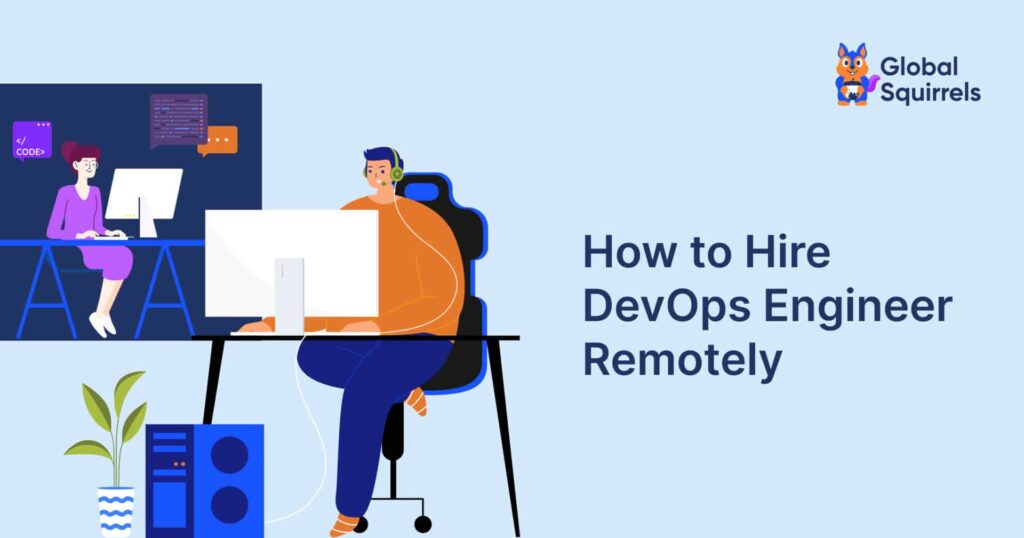How to Hire DevOps Engineers Remotely – A Comprehensive Guide

DevOps engineers build connectivities among several applications through coding and scripting. They are integral to organizations that work with the latest software and applications. In this context, hire DevOps Engineers could be crucial as they add technical values and help organizations to grow.
To hire remote devops engineers involves several stages like accessing devops engineer profiles, verifying their credentials, checking their knowledge, skill, and expertise, etc.
You are on the right page if you plan to hire DevOps Engineers remotely. In this blog, you will find how to hire DevOps Engineers for your organization.
Understand the job roles of DevOps engineers
The job roles of devops engineers are essential. They are not just system administrators but are skilled professionals who bridge the gap between software development and IT operations. They focus on automating and streamlining processes to improve software development, deployment, and infrastructure management.
The specific job roles depending on the category of DevOps engineers that employers must know during hire remote devops engineers. There are seven devops engineer categories such as:
- Infrastructure devops engineers
- Platform devops engineers
- Security devops engineer
- Cloud devops engineers
- SRE (Site Reliability Engineers)
- Release engineers
- DevOps lead/manager
The salary structure of DevOps engineers
The salary structure of DevOps engineers depends on their skills, experience, and qualification background. As per level, the salary structure is as follows:
Entry-level: Professionals with less than 2 years of experience typically earn the lowest salaries, ranging from $50,000 to $70,000.
Mid-level: With 3-5 years of experience, devops engineers can expect a salary range of $80,000 to $120,000.
Senior-level: With 5+ years, can command top salaries exceeding $130,000.
Countries that are rich in devops engineers pool
Many countries have experienced devops engineers. Engineers are highly demanding globally because the position is essential for tech companies. If you want to hire DevOps Engineers remotely, you can consider the following countries in terms of skilled professionals, cost-effectiveness, and cultural aspects:
- India
- Mexico
- Philippines
- Brazil
- Poland
- Germany
- Switzerland
- Canada
- The UK
While you know the specific job roles, salary structure, and the country list of available DevOps engineers would help you during the onboarding process of DevOps engineers for your company.
The next step involves how to hire remote devops engineers. Let’s begin!
How to hire DevOps Engineers?
During the hiring process, you must follow the below steps.
Step 1: Define your needs
Craft a detailed job description outlining the technical skills required (like knowledge of CI/CD tools, cloud services, containerization, etc.) and the soft skills necessary for remote work (such as communication, self-discipline, and problem-solving abilities).
Understanding the specific requirements of your project can help you identify the right skills and experience needed in a DevOps Engineer.
Step 2: Sourcing candidates
Utilize platforms like LinkedIn, Indeed, and GitHub to find candidates. Sometimes, the best candidates come through networking and employee referrals. Reach out to your professional network for potential leads.
Step 3: Assessing the candidates
Using coding tests and practical assignments to assess technical abilities with the help of tools like HackerRank, Codility, or bespoke projects can be effective. Assess their ability to work remotely by conducting video interviews to evaluate their communication skills, problem-solving abilities, and cultural fit.
Step 4: Onboarding and integration
Once hired, a structured onboarding process is vital. Ensure they access all necessary tools and are introduced to key team members. Establish a routine of regular check-ins and provide consistent feedback, especially in the early stages of their employment.
Encouraging interaction with other team members via tools like Slack, Zoom, and Trello can help build a collaborative environment.
Step 5: Legal and compliance considerations
Ensure compliance with labor laws and regulations in both your country and the country of the remote employee. It includes contracts, tax laws, leaves, benefits, and work-hour regulations.
Getting the right candidate for your company’s requirements might be a challenge.
Further, compliances based on local labor laws, regulations, and other laws regarding the remote hiring of DevOps engineers involve complex processes.
You can get assistance from EOR and PEO platforms such as Global Squirrels to bypass such hassle and time-consuming engagement.
How does Global Squirrels help to hire remote devops engineers?
Global Squirrels is one of the leading platforms that assists global employers to hire devops engineers remotely. The platform has an extensive global talent pool from several industries. You can access the talent pool once you sign up with Global Squirrels.
Besides hiring, the platform also helps you in payroll management. Request a demo and get insights if you are looking for EOR services or PEO services.
Following benefits you will get once you sign up with Global Squirrels:
- You can access a global talent pool
- No need for a local entity
- You can avail of EOR and PEO based on your requirements
- It assists you in compliance with international labor laws
- Besides individual employees, you can hire contractors
- It is available in the most cost-effective way
The pricing starts at $1.49/hour/employee + payroll cost. Additionally, other plans are also available based on your requirements.
Conclusion
Hire DevOps Engineers using Global Squirrels would be a good option as it’s the most cost-effective and hassle-free solution. There are other options available for you to hire remote devops engineers, which are complex and time-consuming. The key to successful remote hiring is clear communication, understanding your needs, and having a robust onboarding process.
Beta feature

